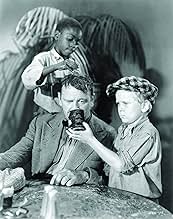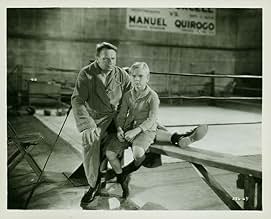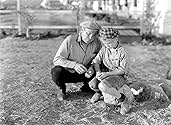AVALIAÇÃO DA IMDb
7,2/10
3,9 mil
SUA AVALIAÇÃO
Adicionar um enredo no seu idiomaAn alcoholic ex-boxer struggles to provide a good living for his son.An alcoholic ex-boxer struggles to provide a good living for his son.An alcoholic ex-boxer struggles to provide a good living for his son.
- Ganhou 2 Oscars
- 5 vitórias e 3 indicações no total
Roscoe Ates
- Sponge
- (as Rosco Ates)
Dannie Mac Grant
- Boy Taunting Dink
- (não creditado)
Frank Hagney
- Manuel Quiroga - Mexican Champ
- (não creditado)
Dell Henderson
- The Doctor
- (não creditado)
Tom McGuire
- Los Angeles Promoter
- (não creditado)
Walter Percival
- Los Angeles Promoter
- (não creditado)
Lee Phelps
- Louie - the Bartender
- (não creditado)
Andy Shuford
- Boy at Racetrack
- (não creditado)
Dan Tobey
- Ring Announcer
- (não creditado)
Avaliações em destaque
'The Champ' seems to have been a blueprint film for all the others of the tough-tender school that followed it, and - owing entirely to Jackie Cooper's playing perfectly off of Wallace Beery's has-been, alcoholic pug - it's perfectly charming.
Yes, the fight scene is rather hokey: had they tried to use Wallace Beery's telegraphed-the-day-before roundhouse punches, even the toe-to-toe sluggers of 'The Champ's bygone day wouldn't have survived one round in the ring. But the film isn't about the fight scene, it's about the love of father for son and son for father - and to this day 'The Champ's' story artfully delivers its soft knock-out blow with tender sucker punches and love-taps to the heart.
Compared with today's fare 'The Champ's' pacing is slow but the time taken works nicely, especially in the one-on-one scenes captivatingly played by Cooper and Beery.
There's plenty of archetypal King Vidor composition-in-frame that's still imitated today, and in many instances the lighting is exemplary of the gorgeous black & white textural artistry of Hollywood's Golden Age. Lovers of classic B&W work might want to grab more than a few frames from the DVD.
Beery's work is quite good here, but Jackie Cooper's remarkable, potent chops steal the show - and your heart; though 'The Champ' has a good many fine, classical attributes there's none better in it than Cooper's unforgettable performance.
Yes, the fight scene is rather hokey: had they tried to use Wallace Beery's telegraphed-the-day-before roundhouse punches, even the toe-to-toe sluggers of 'The Champ's bygone day wouldn't have survived one round in the ring. But the film isn't about the fight scene, it's about the love of father for son and son for father - and to this day 'The Champ's' story artfully delivers its soft knock-out blow with tender sucker punches and love-taps to the heart.
Compared with today's fare 'The Champ's' pacing is slow but the time taken works nicely, especially in the one-on-one scenes captivatingly played by Cooper and Beery.
There's plenty of archetypal King Vidor composition-in-frame that's still imitated today, and in many instances the lighting is exemplary of the gorgeous black & white textural artistry of Hollywood's Golden Age. Lovers of classic B&W work might want to grab more than a few frames from the DVD.
Beery's work is quite good here, but Jackie Cooper's remarkable, potent chops steal the show - and your heart; though 'The Champ' has a good many fine, classical attributes there's none better in it than Cooper's unforgettable performance.
I had seen the 1979 remake starring Jon Voigt and Faye Dunaway (the female part was much more important ) and I was not that impressed.Jon Voigt was too good-looking and too handsome to portray the champ successfully.The original really blew my mind:the Wallace Beery /Jackie Cooper team was a winning one and it's one of the best pairings man/boy in the history of cinema ,with echoes of Charlie Chaplin's "the kid" .Although the movie takes place in the prizefighters milieu,the plot is pure melodrama ,mainly aimed at the female audience .The reactionary side of the melodrama -the posh lady horrified at the people around her boy, a "normal" wealthy family is the safe way to happiness,etc- is present but emotion survives the tear-jerker side .And I dare you not to shed a tear when the boy screams "I want the champ!".
Former heavyweight champ Andy Purcell goes down to Tijuana in hopes of getting a fight. Andy's son, Dink, watches his father train, but Andy gives into his vices of gin and gambling, which constantly gets him in trouble. Andy wins Dink a race horse, which is entered in a race, where Andy meets his ex-wife Linda (with her current husband Tony) at the track and wants to be reunited with her son (Dink) and give him a better life outside of the one Andy gives him. Andy gets arrested and thrown in jail, where he decides that Dink would be best living with his mother, which devastates Dink (who idolizes his father). Andy is released from jail (thanks to Tony & Linda)and gets a bout with the Mexican heavyweight champ, where Dink runs back to his father to watch him hopefully win the fight, even though he is out of shape and not at the level of his opponent. The film is a toughing piece of cinematic brilliance, despite the static camera-work (very uncharacteristic of King Vidor). Beery and Cooper work so well together and their performances are what makes this film a classic. The script does not lose anything in the 70 plus years since its release. If the ending doesn't make you shed tears, you have to be a robot. Rating, 8.
Yes we've seen it thousands of times, but each time is a wonderful experience. You know the story by heart, but you discover new things again and again. This film is King Vidor in all his glory. Fantastic photography, great shots. For a film of 1931, it's crazy how the image remains beautiful.
The story is gripping and the acting is superb even though at times over the top.
Deserves to be shown and watched again and again.
Father/son movies were nothing new when November 1931's "The Champ" was released. But its ending is what struck movie audiences as unique, one of cinema's most potent tear jerkers ever projected on the screen. "The Champ is one of the greatest love stories ever put to film, the story of a man who wants to do right but fails and a son who never gives up on him," film reviewer Jerry Roberts writes. "(Wallace) Beery is what gives the film its foundation."
Beery performance was so powerful he won the 5th Academy Awards' Best Actor in a virtual tie with Frederic March for his role in 1931's "Dr. Jekyll and Mr. Hyde." After receiving the statuette, Berry, in the middle of renegotiating his contract with MGM, demanded he be paid one dollar more than the studio's highest paid actor. The agreement made him the richest salaried Hollywood actor at that time. Francis Marion wrote "The Champ's" screenplay especially with Beery in mind. It proved to be a great inspiration since she won the Academy Award's Best Story for her work on bringing bucketful of tears to millions of viewers.
Her tale has Andy "Champ" Purcell (Beery), a former world heavyweight title holder, down on his luck and turns to drink and gambling. Through his divorce, Andy was able to keep his son, Dink (Jackie Cooper), until his mother Linda (Irene Rich), sees him at the racetrack with his father. Remarried into wealth, Linda gets the court to gain custody of Dink. In a classic highly emotional separation scene, Andy, in prison, says goodbye to his loyal son, only to have Dink jump off the train transporting him to his mother's home. He wants to see his father fight one more match facing off against the Mexican champion in what turns out to be a brutal match. A preview audience loved the movie, except for the ending. MGM's head of production, Irving Thalberg, had the match reshot, ending with one of the most emotional 18-handkerchief scenes in cinema.
Despite the warmth displayed on the screen between the two actors, Beery and Cooper did not get along. Beery hated childhood actors, and it was evident he didn't enjoy his time with the nine-year-old Jackie. Publicly, he diplomatically described Cooper as "a great kid," but the boy claimed the actor treated him like "an unkempt dog." In retrospect, Cooper said it was pure jealousy that made Beery, in scene after scene, try to upstage him. Beery was so fed up with the director calling for tight shots of Cooper's teary face, he demanded in his new MGM contract that no juvenile actor could ever have a close-up in any picture with him. Beery vowed he would never appear in another movie with Cooper again after "The Champ" wrapped. But so popular was the acting duo that he took back his promise in the mid-1930s, sharing screen time again with Cooper in three more films.
Besides Beery's tied win, the Academy nominated "The Champ" for Best Picture as well as its director, King Vidor for Best Director. Francis Marion's award-winning script was so brilliant Red Skelton adapted it into his 1952 film, "The Clown," where he plays the Andy character as a has-been clown rather than a boxer. Later generations are more familiar with director Franco Zeffirelli's 1979 version of "The Champ" with Jon Voight, Faye Dunaway and Ricky Schroder as the son. This film was actress Joan Blondell's last movie.
Beery performance was so powerful he won the 5th Academy Awards' Best Actor in a virtual tie with Frederic March for his role in 1931's "Dr. Jekyll and Mr. Hyde." After receiving the statuette, Berry, in the middle of renegotiating his contract with MGM, demanded he be paid one dollar more than the studio's highest paid actor. The agreement made him the richest salaried Hollywood actor at that time. Francis Marion wrote "The Champ's" screenplay especially with Beery in mind. It proved to be a great inspiration since she won the Academy Award's Best Story for her work on bringing bucketful of tears to millions of viewers.
Her tale has Andy "Champ" Purcell (Beery), a former world heavyweight title holder, down on his luck and turns to drink and gambling. Through his divorce, Andy was able to keep his son, Dink (Jackie Cooper), until his mother Linda (Irene Rich), sees him at the racetrack with his father. Remarried into wealth, Linda gets the court to gain custody of Dink. In a classic highly emotional separation scene, Andy, in prison, says goodbye to his loyal son, only to have Dink jump off the train transporting him to his mother's home. He wants to see his father fight one more match facing off against the Mexican champion in what turns out to be a brutal match. A preview audience loved the movie, except for the ending. MGM's head of production, Irving Thalberg, had the match reshot, ending with one of the most emotional 18-handkerchief scenes in cinema.
Despite the warmth displayed on the screen between the two actors, Beery and Cooper did not get along. Beery hated childhood actors, and it was evident he didn't enjoy his time with the nine-year-old Jackie. Publicly, he diplomatically described Cooper as "a great kid," but the boy claimed the actor treated him like "an unkempt dog." In retrospect, Cooper said it was pure jealousy that made Beery, in scene after scene, try to upstage him. Beery was so fed up with the director calling for tight shots of Cooper's teary face, he demanded in his new MGM contract that no juvenile actor could ever have a close-up in any picture with him. Beery vowed he would never appear in another movie with Cooper again after "The Champ" wrapped. But so popular was the acting duo that he took back his promise in the mid-1930s, sharing screen time again with Cooper in three more films.
Besides Beery's tied win, the Academy nominated "The Champ" for Best Picture as well as its director, King Vidor for Best Director. Francis Marion's award-winning script was so brilliant Red Skelton adapted it into his 1952 film, "The Clown," where he plays the Andy character as a has-been clown rather than a boxer. Later generations are more familiar with director Franco Zeffirelli's 1979 version of "The Champ" with Jon Voight, Faye Dunaway and Ricky Schroder as the son. This film was actress Joan Blondell's last movie.
Você sabia?
- CuriosidadesWallace Beery actually got one less vote than Fredric March in the 1931/1932 Academy Awards voting for best actor, but the rules at the time considered anyone with one or two votes less than the leader as being in a tie. So both got Academy Awards.
- Erros de gravaçãoAs Dink plays on the balcony awaiting his meeting with Linda, he steals chewing gum and candy for himself off of a table on the balcony. He then steals the contents of a box of cigarettes, saying that he'll "bring some home for the Champ", and stuffs them into his right jacket pocket. However, during the ride home, Andy reaches into Dink's right jacket pocket and finds cigars rather than the cigarettes which we clearly saw Dink steal.
- Citações
[Dink compares the swanky home to his own]
Dink Purcell: The Champ and I ain't fixed up swell as this, but our joint's more lively.
- ConexõesEdited into The Our Gang Story (1994)
- Trilhas sonorasThe Monkeys Have No Tails in Pago Pago
(uncredited)
Composer uncertain
Sung a cappella by Wallace Beery
Principais escolhas
Faça login para avaliar e ver a lista de recomendações personalizadas
- How long is The Champ?Fornecido pela Alexa
Detalhes
- Data de lançamento
- País de origem
- Idioma
- Também conhecido como
- El campeón
- Locações de filme
- Empresa de produção
- Consulte mais créditos da empresa na IMDbPro
- Tempo de duração
- 1 h 26 min(86 min)
- Cor
- Proporção
- 1.20 : 1
Contribua para esta página
Sugerir uma alteração ou adicionar conteúdo ausente





































